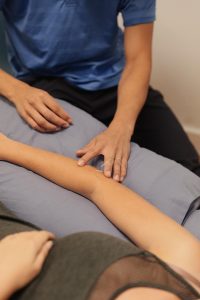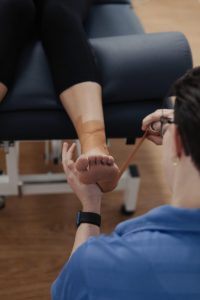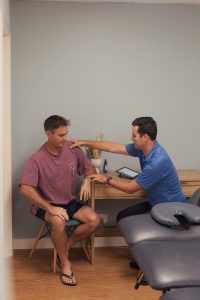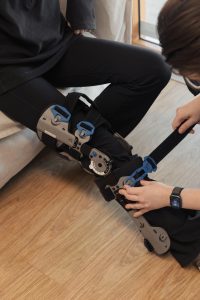Our Physiotherapists at Manly Physiotherapy & Pilates are experienced in providing comprehensive treatment for a wide variety of conditions such as:
• Back pain and neck pain and stiffness
• Hip or groin pain and stiffness
• Headaches
• Sciatic pain
• Sport related injuries and rehabilitation
• Posture optimisation
• Balance or gait disorders
• Soft tissue injuries or conditions such as rotator cuff tears or tendonopathy, tennis elbow, hamstring strains, ilio-tibial band pain, plantar fasciitis
• WorkCover claims
• Respiratory Physiotherapy for conditions such as Asthma or Pneumonia.
• Knee conditions such as patellofemoral pain, ligamentous or meniscal injuries, or arthritis
• Pre and post-operative management
• Paediatric Physiotherapy
What to expect during your treatment:
During your physiotherapy appointment, you can expect a comprehensive and personalised approach to address your specific needs and concerns. Here’s what a typical physiotherapy session may entail:
Initial Assessment:
Your physiotherapist will begin by conducting a thorough assessment. This may involve discussing your medical history, current symptoms, and any specific goals you have for the session. Physical examinations and functional assessments may also be performed to better understand your condition.
Discussion and Goal Setting:
Your physiotherapist will discuss their findings with you and collaborate on setting achievable goals for your treatment. This ensures that the therapy is tailored to your individual needs, whether it’s pain relief, improved mobility, or functional rehabilitation.
Treatment Plan:
Based on the assessment and your goals, your physiotherapist will develop a customized treatment plan. This plan may include a combination of therapeutic exercises, manual therapy, education on posture and ergonomics, and other modalities that align with your specific condition.
Hands-On Techniques:
Physiotherapists often use hands-on techniques such as massage, joint mobilisation, or manipulation to address musculoskeletal issues. These techniques aim to reduce pain, improve mobility, and enhance overall function.
Exercise Prescription:
You may be prescribed specific exercises to perform at home or in the gym. These exercises are designed to strengthen targeted muscles, improve flexibility, and support your overall rehabilitation.
Education:
Physiotherapists provide valuable education about your condition, including its causes and how certain activities or habits may contribute to it. This knowledge empowers you to actively participate in your recovery and prevent future issues.
Ongoing Assessment and Adjustments:
As you progress through your treatment plan, your physiotherapist will continuously assess your response to interventions and make any necessary adjustments to optimise your outcomes.
Support and Guidance:
Throughout the process, you can expect support and guidance from your physiotherapist. They are there to answer your questions, address concerns, and provide motivation to keep you on track with your rehabilitation.
Remember that each physiotherapy session is unique to the individual, and the above steps may vary based on your specific needs and the nature of your condition. Open communication with your physiotherapist is key to ensuring a successful and comfortable rehabilitation experience.
Specialised Physiotherapy
Have you been diagnosed with a more complex problem requiring expert Physiotherapy treatment? At Manly Physiotherapy & Pilates our Physiotherapists are highly qualified to provide specialised Physiotherapy for conditions such as:
• TMJ disorders (Jaw pain)
• Treatment of Vestibular dysfunction such as vertigo, nausea and vomiting.
• Thoracic outlet syndrome or nerve impingement in the arm.
Post Surgical Rehabilitation
- Total joint replacements (shoulder, hip, knee)
- Anterior cruciate ligament (ACL) reconstruction
- Rotator cuff repairs
- Achilles tendon repairs
- Arthroscopic knee surgeries (such as meniscectomies, meniscal repairs)
- Arthroscopic hip surgeries (such as labral repairs)
- Nerve releases (such as cubital tunnel, radial tunnel, carpal tunnel, tarsal tunnel)
- Neck and back surgery (such as fusions, laminectomy, decompression)
- Surgical fixation of fractures of the arms and legs
Dry Needling
 Dry needling utilises a solid filament needle, similar to what is used for oriental acupuncture. The process by which the needles are utilised differs however. Dry needling focuses on reducing /eliminating overactivity in certain muscle groups which may have become overactive or tight due to injury or activity. Your physiotherapist will often offer you this service during a physiotherapy consult (at no extra charge) if they feel you may benefit from it.
Dry needling utilises a solid filament needle, similar to what is used for oriental acupuncture. The process by which the needles are utilised differs however. Dry needling focuses on reducing /eliminating overactivity in certain muscle groups which may have become overactive or tight due to injury or activity. Your physiotherapist will often offer you this service during a physiotherapy consult (at no extra charge) if they feel you may benefit from it.
Sports Injuries
 Our physiotherapists are experienced and have a strong understanding in sports and sports related injuries. Whether your an elite athlete, a beginner or somewhere in between we can surely help you get back into the sporting arena in the quickest time possible!
Our physiotherapists are experienced and have a strong understanding in sports and sports related injuries. Whether your an elite athlete, a beginner or somewhere in between we can surely help you get back into the sporting arena in the quickest time possible!
- Sports injury management and sports specific rehabilitation program
- Athlete screening and performance enhancement
- Strength, conditioning and fitness optimization program
Occupational Physiotherapy
The goal of occupational physiotherapy is to enhance an individual’s ability to perform activities of daily living, such as self-care, work-related tasks, and leisure activities. This may involve assessing and addressing physical limitations, providing rehabilitation, suggesting adaptive equipment, and designing personalized exercise programs. The emphasis is on promoting independence, improving quality of life, and supporting individuals in achieving their goals within their specific occupational roles.
Pre and Post Natal Physiotherapy
Pre and postnatal physiotherapy is a specialized branch of physiotherapy that focuses on the unique healthcare needs of individuals before and after pregnancy. Here’s a brief overview:
**Pre-Natal Physiotherapy:**
Before childbirth, physiotherapy plays a crucial role in supporting the physical well-being of expectant mothers. Pre-natal physiotherapy aims to address issues such as back pain, pelvic girdle pain, and postural changes associated with pregnancy. It often involves exercises to strengthen the pelvic floor, enhance core stability, and promote overall physical fitness in preparation for childbirth.
**Post-Natal Physiotherapy:**
After childbirth, the body undergoes significant changes, and postnatal physiotherapy is designed to aid in recovery and address any issues that may arise. Common focuses include pelvic floor rehabilitation, abdominal muscle reconditioning, and addressing musculoskeletal issues arising from the physical demands of pregnancy and childbirth. Postnatal physiotherapy aims to restore optimal function, alleviate discomfort, and support women in regaining strength and flexibility.
Both pre and postnatal physiotherapy involve tailored assessments and interventions to meet the specific needs and goals of the individual. These services are valuable in promoting a smoother pregnancy, aiding in recovery after childbirth, and enhancing the overall well-being of mothers during this transformative period.



